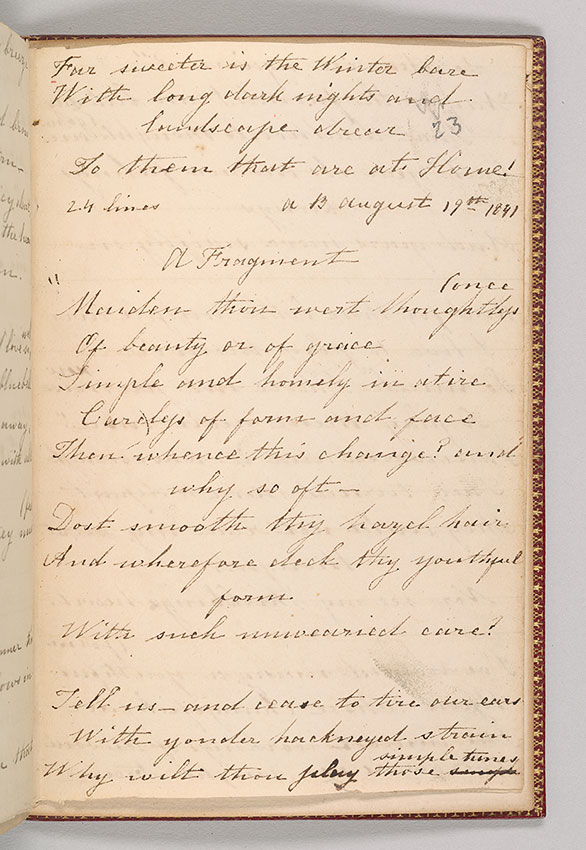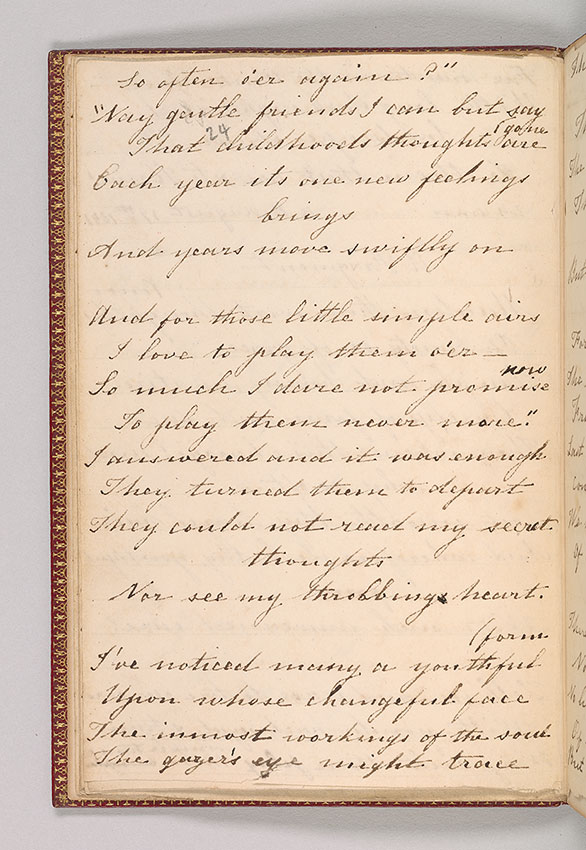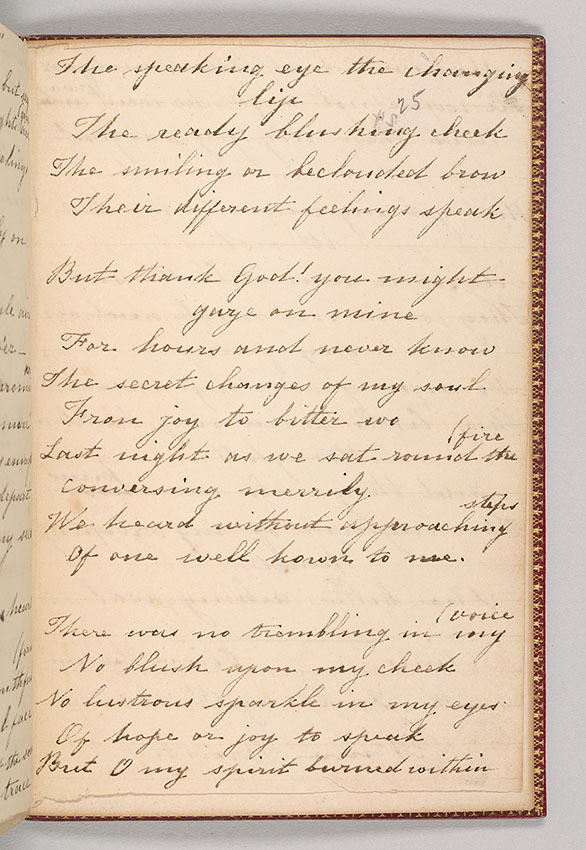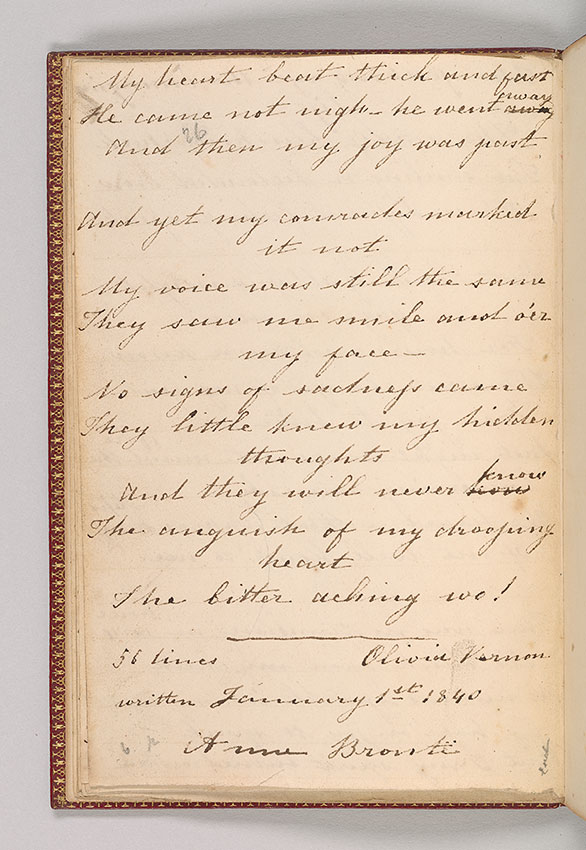"A Fragment", p. 23

Collection of poems : autograph manuscript signed : [Haworth]
The Henry Houston Bonnell Brontë Collection. Bequest of Helen Safford Bonnell, 1969
“Lines Written at Thorp Green” (pp. 21–23)
Composed 19 August 1841, when Brontë was twenty-one and working as a governess at Thorp Green Hall, near York. First published in Poems (1902), pp. 204–205, with incorrect title “Lines Written at Thays Green.” Poem 16 in Chitham (1979). Note that Brontë wrote another poem with the same title (see Chitham 11).
“A Fragment” (“Self-Congratulation”) (pp. 23–26)
Composed on New Year’s Day 1840, when Brontë was about to turn twenty. This is the only composition in the notebook to be included in the first published book by Charlotte, Emily, and Anne Brontë, Poems by Currer, Ellis, and Acton Bell (London: Aylott & Jones, 1846). Titled “A Fragment” in the manuscript, “Self-Congratulation” in Poems. For publication, Brontë made several revisions, changing the first word from “Maiden” to “Ellen,” for example, removing the Gondal “signature” Olivia Vernon, and revising punctuation. Poem 9 in Chitham (1979); pp. 463–65 in Alexander (2010).
Far sweeter is the Winter bare
With long dark nights and landscape drear
To them that are at Home!
24 lines AB August 19th 1841
A Fragment
“Maiden thou wert thoughtless once
Of beauty or of grace
Simple and homely in atire
Careless of form and face
Then whence this change? And why so oft –
Dost smooth thy hazel hair
And wherefore deck thy youthful form
With such unwearied care?
Tell us – and cease to tire our ears
With yonder hackneyed strain
Why wilt thou play those simple simple tunes
Text as published in Poems (1846)
SELF-CONGRATULATION.
Ellen you were thoughtless once
Of beauty or of grace,
Simple and homely in attire,
Careless of form and face;
Then whence this change? And wherefore now
So often smooth your hair?
And wherefore deck your youthful form
With such unwearied care?
Tell us—and cease to tire our ears
With that familiar strain—
Why will you play those simple tunes
| Attachment | Size |
|---|---|
| 20.04 MB |
"A Fragment", p. 24

Collection of poems : autograph manuscript signed : [Haworth]
The Henry Houston Bonnell Brontë Collection. Bequest of Helen Safford Bonnell, 1969
“A Fragment” (“Self-Congratulation”) (pp. 23–26)
Composed on New Year’s Day 1840, when Brontë was about to turn twenty. This is the only composition in the notebook to be included in the first published book by Charlotte, Emily, and Anne Brontë, Poems by Currer, Ellis, and Acton Bell (London: Aylott & Jones, 1846). Titled “A Fragment” in the manuscript, “Self-Congratulation” in Poems. For publication, Brontë made several revisions, changing the first word from “Maiden” to “Ellen,” for example, removing the Gondal “signature” Olivia Vernon, and revising punctuation. Poem 9 in Chitham (1979); pp. 463–65 in Alexander (2010).
So often o’er again?
“Nay gentle friends I can but say
That childhood[’]s thoughts are gone
Each year its one new feelings brings
And years move swiftly on
And for those little simple airs
I love to play them o’er –
So much I dare not promise now
To play them never more.”
I answered and it was enough
They turned them [i.e., then] to depart
They could not read my secret thoughts
Nor see my throbbing heart.
I’ve noticed many a youthful form
Upon whose changeful face
The inmost workings of the soul
The gazer’s eye might trace
Text as published in Poems (1846)
So often, o’er again?
“Indeed, dear friends, I can but say
That childhood’s thoughts are gone;
Each year its one new feelings brings,
And years move swiftly on:
“And for these little simple airs—
I love to play them o’er
So much—I dare not promise, now
To play them never more.”
I answered—and it was enough;
They turned them to depart;
They could not read my secret thoughts,
Nor see my throbbing heart.
I’ve noticed many a youthful form,
Upon whose changeful face
The inmost workings of the soul
The gazer well might trace;
| Attachment | Size |
|---|---|
| 20.04 MB |
"A Fragment", p. 25

Collection of poems : autograph manuscript signed : [Haworth]
The Henry Houston Bonnell Brontë Collection. Bequest of Helen Safford Bonnell, 1969
“A Fragment” (“Self-Congratulation”) (pp. 23–26)
Composed on New Year’s Day 1840, when Brontë was about to turn twenty. This is the only composition in the notebook to be included in the first published book by Charlotte, Emily, and Anne Brontë, Poems by Currer, Ellis, and Acton Bell (London: Aylott & Jones, 1846). Titled “A Fragment” in the manuscript, “Self-Congratulation” in Poems. For publication, Brontë made several revisions, changing the first word from “Maiden” to “Ellen,” for example, removing the Gondal “signature” Olivia Vernon, and revising punctuation. Poem 9 in Chitham (1979); pp. 463–65 in Alexander (2010).
The speaking eye the changing lip
The ready blushing cheek
The smiling or beclouded brow
Their different feelings speak
But thank God! You might gaze on mine
For hours and never know
The secret changes of my soul
From joy to bitter wo
Last night as we sat round the fire
Conversing merrily
We heard without approaching steps
Of one well known to me.
There was no trembling in my voice
No blush upon my cheek
No lustrous sparkle in my eyes
Of hope or joy to speak
But O my spirit burned within
Text as published in Poems (1846)
The speaking eye, the changing lip,
The ready blushing cheek,
The smiling, or beclouded brow,
Their different feelings speak.
But, thank God! You might gaze on mine
For hours, and never know
The secret changes of my soul
From joy to keenest woe.
Last night, as we sat round the fire
Conversing merrily,
We heard, without, approaching steps
Of one well known to me!
There was no trembling in my voice
No blush upon my cheek,
No lustrous sparkle in my eyes,
Of hope, or joy, to speak;
But, oh! My spirit burned within,
| Attachment | Size |
|---|---|
| 20.04 MB |
"A Fragment", p. 26

Collection of poems : autograph manuscript signed : [Haworth]
The Henry Houston Bonnell Brontë Collection. Bequest of Helen Safford Bonnell, 1969
“A Fragment” (“Self-Congratulation”) (pp. 23–26)
Composed on New Year’s Day 1840, when Brontë was about to turn twenty. This is the only composition in the notebook to be included in the first published book by Charlotte, Emily, and Anne Brontë, Poems by Currer, Ellis, and Acton Bell (London: Aylott & Jones, 1846). Titled “A Fragment” in the manuscript, “Self-Congratulation” in Poems. For publication, Brontë made several revisions, changing the first word from “Maiden” to “Ellen,” for example, removing the Gondal “signature” Olivia Vernon, and revising punctuation. Poem 9 in Chitham (1979); pp. 463–65 in Alexander (2010).
My heart beat thick and fast
He came not nigh – he went away away
And then my joy was past
And yet my comrades marked it not
My voice was still the same
They saw me smile and o’er my face –
No signs of sadness came
They little knew my hidden thoughts
And they will never now know
The anguish of my drooping heart
The bitter aching wo!
––––––––––––
56 lines Olivia Vernon
written January 1st 1840
Anne Brontë
Text as published in Poems (1846)
My heart beat full and fast!
He came not nigh—he went away—
And then my joy was past.
And yet my comrades marked it not:
My voice was still the same;
They saw me smile, and o’er my face
No signs of sadness came.
They little knew my hidden thoughts;
And they will never know
The aching anguish of my heart,
The bitter burning woe!
| Attachment | Size |
|---|---|
| 20.04 MB |